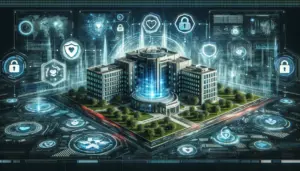Modular Data Centers Facilitating “Smarter” Cities
Cities around the globe are racing to become smarter using data and technology to improve quality of life for its citizens and to foster economic growth. Smart Cities require IoT devices and sensors integrated with Information and Communications at a large scale. Enormous data gets collected from, processed, and fed to transportation network, autonomous vehicles, waste management, hospitals, law enforcement, and other public services. At the core of it, a smart city is a giant ecosystem to collect, process and analyze data.
We’ve experienced rapid urbanization, in 2015 about 82.7% of the total population in the USA lived in urban areas, as opposed to 79.9% in the year 2000. This ration is expected to go up to 89.2% by 2045. As cities grow and become smarter, the volume of data collected will grow exponentially. A robust infrastructure is required to support this data and computing demand. All this potential is exciting but meeting these kinds of goals is daunting if you are not already working with an experienced partner with the right solution set.
The Solution: BASELAYER Modular Data Center
More and more cities are looking into transforming themselves into smart cities. Since literally everything is connected to the internet in some way, and traditional data centers are overly expensive and hard to maintain, we have seen an uptick in utilities, cities, and hospitals looking at modular data centers to help provide this service on-time and under-budget.
Data centers like the ones designed and deployed by BASELAYER can facilitate the vision of smarter cities and help smaller towns grow and attract new business. BASELAYER works closely with cities from design through installation providing extensive data center experience through every step of the project.
Scalability is crucial for smart city infrastructure as cities plan for years in advance and require a sustainable solution that can grow in capacity as the need for more computing arise. Our Lego inspired approach to design allows cities to quickly and easily create solutions according to their specifications.
Modular Data Centers Drive Growth
Utility providers, in particular, are already seeing the benefits of modular data centers. City leaders themselves are also discovering the value of data centers when it comes to attracting new businesses. Businesses are going to those city leaders and saying, ‘Oh, you maintain a modern data center? Yes, sure, I’ll move in.” It helps them get businesses to locate within their city because they’re more technologically capable than competing cities down the road. A smart city ecosystem also opens opportunities for new businesses to utilize this data and create software for the city and residents.
Another good example is the telecom industry. You own the cell towers, and the land that the cell tower sits on. By putting a modular data center on that cell tower ground, you just gave yourself the ability to call up service providers such as Netflix and say, ‘Hey, I have a data center sitting right in the middle of this town, and I could get you access to 25,000 people at X latency.’ That’s a sales tool and a new revenue stream, utilizing your current infrastructure.
When you talk about that to cell tower providers and municipalities, they start saying, ‘I can make money from this.’ That’s why you see interest in providing fast, secure, dependable data.
BASELAYER invented the software-defined modular data center. Our goal is to reshape how performance is viewed in the data center through advanced modular technology, infrastructure management software and big data analytics.
To learn more, visit baselayer.com/products.








